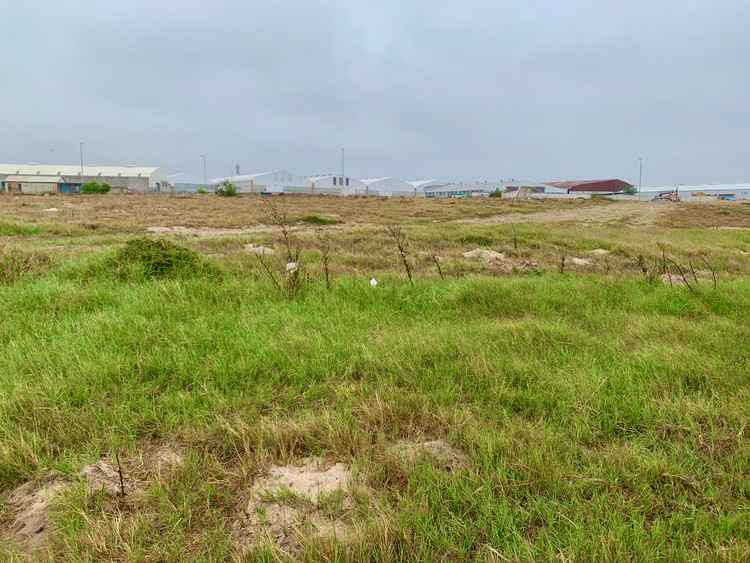July deadline to relocate 1,500 Dunoon families “is no longer feasible”
“The units will not be for ownership. They will be owned by the province and leased to the beneficiaries,” says MEC
The site to which 1,500 families will be relocated on Winning Way in Milnerton. Archive Photo: Peter Luhanga
It is unclear whether authorities will meet their July deadline to relocate 1,500 families from Dunoon to nearby Winning Way industrial park. The relocation to the Transitional Residential Units (TRUs) is to mitigate the spread of Covid-19 as Dunoon is overcrowded and currently considered a pandemic hotspot.
On 21 November, businesses were asked to comment on the City of Cape Town’s application to rezone three vacant plots, constituting about 4,732 square metres of the Winning Way industrial park. The proposed rezoned property will be added to land the City and provincial government had bought for R64.6 million.
Three months ago, Minister of Human Settlements, Water and Sanitation Lindiwe Sisulu announced government plans to relocate people from overcrowded areas in Dunoon and Kosovo. Beneficiaries, identified on the Housing Demand Database, will not return to their current homes after being relocated. During a site visit with Sisulu, Western Cape MEC for Human Settlements Tertius Simmers told GroundUp that residents would be moved to the TRU in July.
Since May, there have been sporadic protests in the area sparked by the plans to relocate residents onto the Winning Way land.
The unrest prompted Western Cape MEC for Human Settlements Tertius Simmers to visit the area on Monday. He was accompanied by other officials on the Dunoon Project Steering Committee who also did a presentation to update residents on the progress of the project.
According to the presentation:
- Appointment of professionals, identify and secure land is 100% completed
- Statutory planning is 50% completed
- The design of internal and bulk services is 40% completed
- Design of top structures is 80% completed
- Procurement of contractors for services is only at 15%
- Procurement of contractors for top structures is 80% completed
- There has not yet been any installation of services
It is also not clear who the beneficiaries to be relocated will be.
On Monday, Simmers said it will cost R180 million to construct the units for 1,500 families. He assured residents that the area will not be like Blikkiesdorp. He said the housing units will have a 30-year lifespan.
“The units will not be for ownership. They will be owned by the province and leased to the beneficiaries,” said Simmers.
Asked if the project would meet the deadline, Simmers said, “July is not a feasible date. If all goes according to plan it will take 14 to 21 days. Construction will commence once the plans have been approved. We are taking much public engagements … Much disinformation [is] going around,” he said.
Mayco member for Human Settlements Malusi Booi said, “We are in the process of looking for other parcels of vacant land along the N7. If we get another piece of land those people stopping the project will not benefit from it. We lost two MyCiTi bus stations in Dunoon, one in Milnerton. Budget needs to be redirected to buy buses for the middle class to go to work. At some point we need to arrest someone.”
Booi also rubbished claims that a list of beneficiaries has already been made. “If anyone is circulating a list they must be reported,” he said.
Ward 104 Councillor Lubabalo Makeleni (ANC) explained that two informal settlements, Doornbach also known as Site 5 and Siyahlala, were fighting for the earmarked land.
The land had been purchased in 2018 and at the time there were already plans to relocate some residents living near the railway line. “Then Covid-19 happened,” said Makeleni.
A police officer attending the meeting appealed to community leaders to isolate “criminals” taking part in the protests. “Most of these are kids making petrol bombs. Instead of cops dealing with crime, we are dealing with thuggery,” he said.
Support independent journalism
Donate using Payfast

Next: Nomandla Yako, who defied Thabo Mbeki by importing HIV medicines, has died
Previous: Budget breaks President Ramaphosa’s promise, say economists
© 2020 GroundUp.
This article is licensed under a Creative Commons Attribution-NoDerivatives 4.0 International License.
You may republish this article, so long as you credit the authors and GroundUp, and do not change the text. Please include a link back to the original article.

